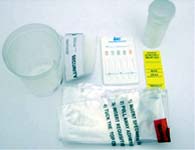Drug
Testing
Has
No
Impact
on
Student
Drug
Use,
Study
Finds
5/23/03
While the US Supreme Court has twice okayed the drug testing of school kids on the grounds that the invasion of their privacy is offset by the role of drug testing in preventing drug use, the first major study of the efficacy of drug testing in schools has found that it just isn't so. In fact, the study found that drug use is as frequent in schools with testing as in schools without it. The findings, which every activist faced with a proposal to institute school drug testing should have in hand, are a serious blow to the rationale behind school drug testing. The federally-financed survey of 76,000 students and 891 schools across the country, conducted by the social scientists at the University of Michigan who do the Monitoring the Future surveys of student drug use, came up with only statistically insignificant differences between schools which subject their students to drug testing and those that don't. Among 12th graders, for example, 37% reported having smoked pot at schools that tested, while 36% reported doing so at schools that didn't. Similarly, 21% reported having used other drugs at schools that tested, while 19% reported doing so at schools that didn't. The findings hold true with other grades as well, the researchers reported. The survey represents the only large or nationally representative sample of schools that has ever been used to evaluate the effectiveness of school drug testing. "It suggests that there really isn't an impact from drug testing as practiced," said lead researcher Lloyd Johnston in announcing the study results. "We think the reason so few schools test their students for drugs is that it is an expensive undertaking. Schools are very pressed for funds, and I would say that the results of our investigation raise a serious question of whether drug testing is a wise investment of their resources. It's also very controversial with a lot of students and parents," Johnston added. "The way that drug testing in the schools has been carried out looks very unpromising. I have no doubt one could design drug testing programs that could deter teen drug use, but at what monetary cost and what cost in terms of the intrusion into the privacy of our young people?" Johnston asked.
The results of the study could put a damper on the use of drug testing in the schools, according to one attorney who has played a lead role in litigating school drug testing cases. "Now there should be no reason for a school to impose an intrusive or even insulting drug test when it's not going to do anything about student drug use," said Graham Boyd of the American Civil Liberties Union's Drug Policy Litigation Project, who argued the case against drug testing before the Supreme Court last year. While the Supreme Court, in its two rulings allowing drug testing of student athletes (1995) and students involved in extracurricular activities (2002), may have allowed ideology to trump science in finding that drug testing prevents teen drug use, now the science is available to rebut that presumption. Battles to block student drug testing may have been lost at the high court, but this study provides powerful ammunition to win them at the school district level. The full study, "The relationship
between student illicit drug use and school drug-testing policies," published
in the Journal of School Health, can be found at
|

